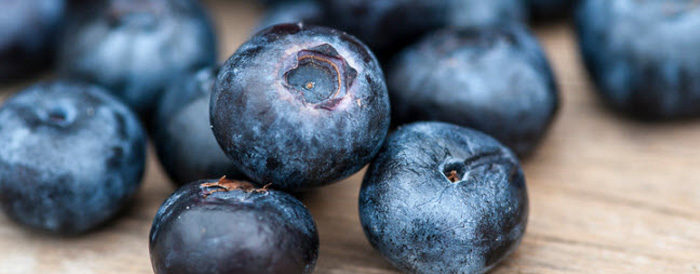
Foods to Help Prevent Colds and Flu
It’s that time of year – cold and flu season! It’s important to keep your immune system on track – and a healthy diet and lifestyle can help. Several nutrients, such as iron, zinc, and vitamin C, are essential for a healthy immune system. Flavonoids found in tea, apples, cruciferous vegetables (like broccoli) and other plant-based foods provide immune-boosting benefits, too.
Here are a few of the foods that can help fortify your defenses this cold and flu season:
Blueberries
Research shows that blueberries have the highest levels of disease-fighting antioxidants of all commonly consumed fruit. These tiny berries also contain quercetin, a flavonoid that acts like an antihistamine and anti-inflammatory, and may protect against heart disease and cancer. Researchers speculate that quercetin’s antihistamine effect may also help to reduce symptoms associated with allergies, including a runny nose and watery eyes. No fresh blueberries at your local market? No problem. Go for frozen – they’re also nutritionally rich. Sprinkle some blues on your yogurt, blend into a smoothie, or enjoy them straight from the fridge!
Garlic
Garlic can do much more than simply add flavor. This pungent clove contains allicin, a sulfuric compound with powerful antioxidants. A 2001 study in the journal Advances in Therapy found that people who took garlic supplements for 12 weeks had fewer colds than those who took a placebo. And of those who did get sick, those who took the garlic supplement felt better faster. Don’t want to deal with garlic breath? Try a garlic supplement. Most clinical studies have used aged garlic extract (AGE) or enteric-coated, dried garlic tablets (dose: 600 to 1,200 milligrams daily in divided doses).
Broccoli
Broccoli is loaded with Vitamin C, a nutrient that plays an important role in a healthy immune response. In fact, just one cup of this crunchy veggie contains more Vitamin C than an orange! And, as an added bonus, broccoli is rich in calcium and packed with fiber. Try this ginger shrimp and broccoli recipe to reap all of this vegetable’s wonderful benefits.
Salmon
This omega-3-rich fish not only helps reduce the risk of heart disease, but also encourages the production and movement of lymphocyte cells, which help to bolster immune response. Plus, salmon is a rich source of Vitamin D, which has been found to play a role in healthy immune function. Check out this amazing Alaska Salmon with Asian Glaze for your next meal.
Sweet Potatoes
This starchy vegetable is bursting with beta–carotene for luscious locks and radiant skin. Our bodies convert the beta-carotene to Vitamin A, an essential nutrient for maintaining a strong immune system. Vitamin A also keeps the mucous membranes that line our nose and throat healthy and functioning. My favorite way to prepare this root vegetable is to peel and slice into ½ inch strips, then place on a baking sheet. Drizzle with olive oil, sprinkle with cinnamon, and bake at 400 degrees for 15-20 minutes or until golden brown. Turn potatoes over and bake another 15-20 minutes.
Yogurt
Yogurt contains live and active cultures, which replenishes our immune system with healthy bacteria. Having just 1 cup of calcium-rich yogurt provides nearly 20% of the adult daily requirement for zinc, an essential mineral for healthy immune function. Start your morning with a cup of yogurt or try some of these delicious ways to enjoy yogurt for snacks or dessert.
Remember that in addition to eating these six foods, it is important to stay hydrated and get plenty of rest. Here’s to a happy and healthy season!
Source: WebMD

